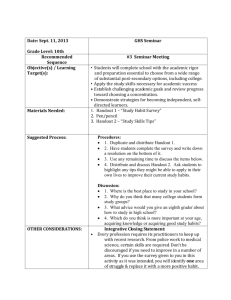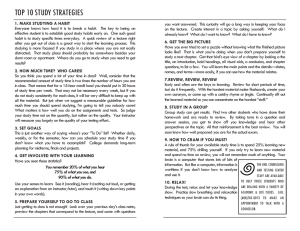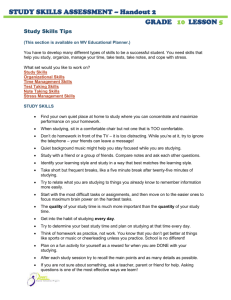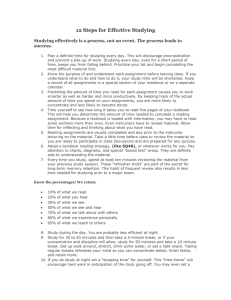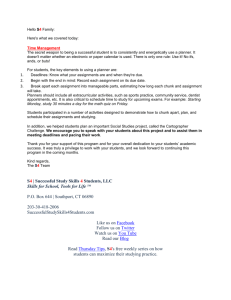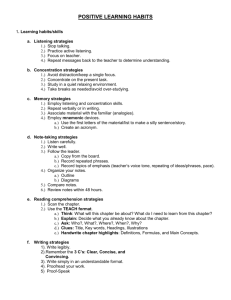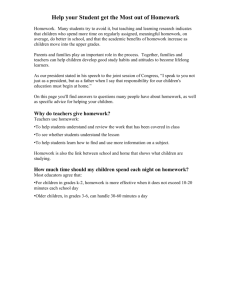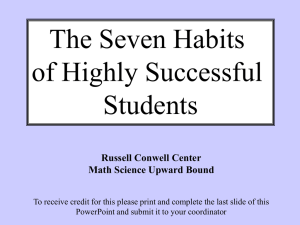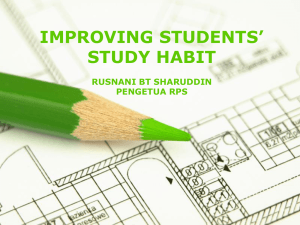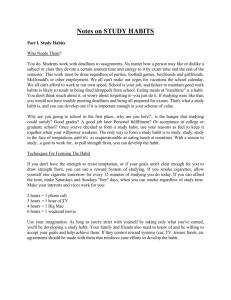Study habits
advertisement
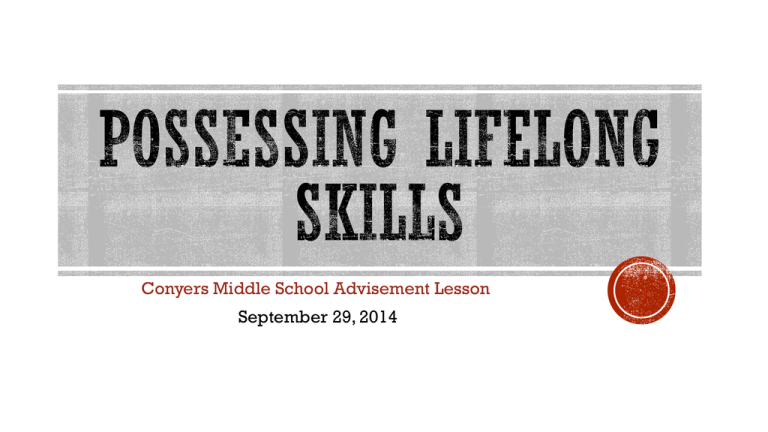
Conyers Middle School Advisement Lesson September 29, 2014 These three standards will assist you in developing the best practices for academic and social success in your life. The skills that you will learn today will prepare you for promotion, high school, college, and most importantly, the real world. Academic Standard A: You will acquire the attitudes, knowledge and skills that contribute to effective learning in school and across the lifespan. Academic Standard B: You will complete school with the academic preparation essential to choose from a wide range of substantial postsecondary options, including college. Personal/Social Standard B: You will make decisions, set goals and take necessary action to achieve goals. WHAT’S THE POINT? After this lesson, I will be able to improve at least one aspect of my habits! HOW WILL I DO THIS? I will complete a survey of my study habits and select a concrete resolution regarding a particular habit I can improve upon. In other words, I am going to identify and evaluate an area of growth and develop a plan to increase mastery in the chosen area. Which areas do I need the most development? Study Skills Organizational Skills Time Management Skills Test Taking Skills Note Taking Skills Stress Management Skills LET’S DISCUSS THE FOLLOWING QUESTIONS WHAT IS A HABIT? DO YOU USE STUDYSKILLS HABITS? Not studying at all group study Laziness put reminders in phone Better things to do review notes Don’t feel like doing it Excuses Tiresome Don’t take notes so I can’t study Too much work Make index card INSTRUCTIONS Number your paper from 1-14. Read the items below and place a check mark by the numbers that correspond with the habits you think you need to improve upon or be more consistent with. Remember that you may check as many as you want. __1. I have a study schedule. __2. I have a quiet place to study. __3. I write down my assignments daily. __4. I prioritize and do the urgent assignments first. __5. I take advantage of the tutoring programs and other opportunities for help in my school. __6. I have a study buddy or study group. __7. I am honest with myself about why I didn’t prepare well for a test. __8. I try to concentrate and take good notes. __9. I rewrite my notes or reorganize them before a test. __10. I have the strength to turn the TV off when I have to. __11. I read my notes and I review the text before each test. __12. I ask for clarification from teachers when I need it. __13. I can work without distractions in the place that I usually study. __14. I budget enough time each week to study well. Reading the survey items may remind you of something else that you can do to study better. At the bottom of your paper write down one thing that you will concentrate on during the next few weeks in order to improve your ability to study. At this moment, take the time out to also copy this in your notebook or agenda to remind yourself to follow through with it. MY STRONGEST STUDY-SKILLS HABIT MY WEAKEST STUDY-SKILLS HABIT Split the class into four groups. Have them discuss the following questions: GROUP 1: Where is the best place to study in your home? GROUP 2: Why do you think that many college students form study groups? GROUP 3: What advice would you give a fifth grader about how to study in middle school? GROUP 4: How can you develop better study habits? Can you remember the six types of skills you should develop? STUDY-SKILLS Find your own quiet place at home to study where you can concentrate and maximize performance on your homework. When studying, sit in a comfortable chair but not one that is TOO comfortable. Don’t do homework in front of the TV – it is too distracting. While you’re at it, try to ignore the telephone – your friends can leave a message! Quiet background music might help you stay focused while you are studying. Study with a friend or a group of friends. Compare notes and ask each other questions. Identify your learning style and study in a way that best matches the learning style. Take short but frequent breaks, like a five minute break after twenty-five minutes of studying. Try to relate what you are studying to things you already know to remember information more easily. Start with the most difficult tasks or assignments, and then move on to the easier ones to focus maximum brain power on the hardest tasks. The quality of your study time is much more important than the quantity of your study time. Get into the habit of studying every day. Try to determine your best study time and plan on studying at that time every day. Think of homework as practice, not work. You know that you don’t get better at things like sports or music or cheerleading unless you practice. School is no different! Plan on a fun activity for yourself as a reward for when you are DONE with your studying. After each study session try to recall the main points and as many details as possible. If you are not sure about something, ask a teacher, parent or friend for help. Asking questions is one of the most effective ways we learn! Plan to spend MORE time (not less time) on the subjects that are harder for you. Use things like outlines, charts, or flashcards to help you organize and learn new material. You’ll be reviewing the material while you are making these tools, and you’ll have them to use later when it’s time to study for tests. Use a planner to keep track of homework assignments, tests and projects. Write in your planner every single day so that it becomes a habit! Keep a notebook or folder for all your notes and homework assignments. You might need one for each subject to make things easier. Keep a "To Do" list. Write down things you need to do, then decide what needs to be done right away and what can wait until later. TIME MANAGEMENT SKILLS For each study period, decide what you want to accomplish and how long you will spend on each subject or assignment. Break your workload down into manageable chunks and take your homework one step at a time. Don’t procrastinate (that’s a big word that means putting things off). Give yourself plenty of time to get things done by planning ahead and sticking to a schedule. Be aware of things that distract you or waste your time, and keep them to a minimum. Be well rested before taking tests. Don’t cram for tests! It’s OK to spend extra time studying the night before a big test, but don’t try to learn EVERYTHING that night. Try to find out what type of test you will be taking (essay, multiple choice, True/ False, matching, etc.). It’s likely that test questions will be similar to homework you have done, because homework is "practice." DON’T PANIC. Just tackle one question at a time. If a question is too hard, skip it and come back to it later. NOTE TAKING SKILLS Don’t try to write down everything the teacher says. Focus on the main ideas. When you’re taking notes, use your own words. Keep your notes organized. They will be as important as the text book. Each night, review the notes you took that day. This will make things easier to remember when it comes time to study for the test. Don’t sweat the small stuff. Try to prioritize your activities, and focus on the most important ones. Work off stress through some kind of physical activity. Exercise is a great stress reliever because it takes your mind off of things that are bothering you. Take care of yourself. Be sure to eat right and get enough sleep. Eating too much or too little, or sleeping too much or too little, can aggravate the stress that you already have.
